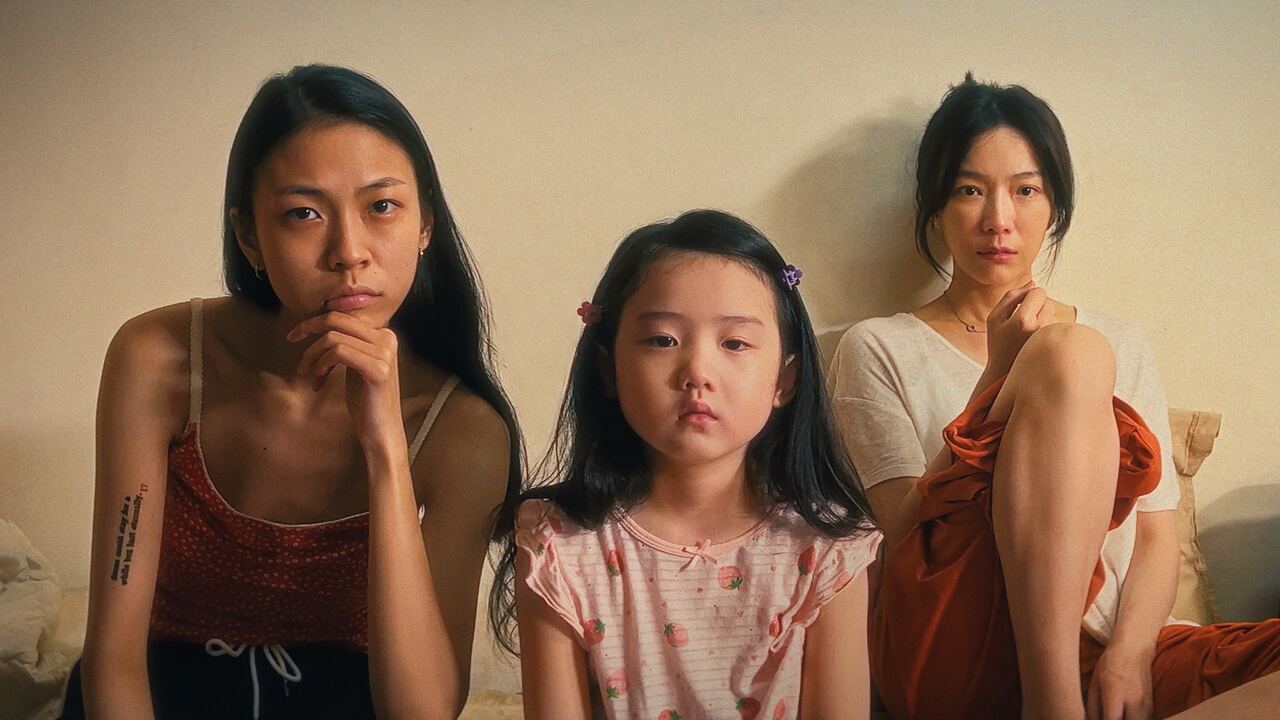
There is a big difference between the Left-Handed Girl Shih-Ching Tsou has made and the Left-Handed Girl she thinks she has made. It was only from this Netflix article that I learned this movie is a personal project for its filmmaker, who got the idea for the story from a childhood memory of her grandfather telling her that the left hand belongs to the devil. Based on the film itself, it would be almost impossible to say whether it stems from the filmmaker's own experiences. Nothing in Left-Handed Girl feels layered or intimate. Shih-Ching doesn't consider her characters in relation to the Taipei they inhabit. What they think about the city's lifestyle, politics, or general atmosphere is something that is never revealed to the audience. Shih-Ching might have just placed her characters in front of a green screen and screamed, "Action!" There is also nothing deep or meaningful in the bond the characters share with each other. For Shih-Ching, the people on the screen are merely figures in a diorama—positioned, posed, and given prefab lines. The conversations don't progress naturally; they have the artificially polished feel of a choreographed speech that's been roughed up just enough to mimic "spontaneity." If Shih-Ching had actually been open, alert, and spontaneous, she wouldn't have cut away so quickly from moments that seemed on their way to becoming intimate, alive, and explosive.
For instance, when Shu-Fen (Janel Tsai) and Johnny (Brando Huang) have something like a date at her house, they have a few drinks, and she starts kissing him. Sex, though, doesn't happen because a drunk Shu-Fen falls asleep. The next day, Johnny goes to Shu-Fen's noodle shop (it's right next to his shop) and tries to talk about the awkward incident that occurred between them the previous night. Shih-Ching, however, prevents this discussion from happening. Is Shu-Fen embarrassed by her actions? Does she think it was a mistake? The director doesn't care. Shu-Fen, after her ex-husband's death, takes care of his funeral, even though he wasn't good to her when he was alive. This funeral business drains her financially, which is why she can't pay the shop rent. The owner gets frustrated and finally gives her a 3-day deadline. I don't think it's a spoiler to say that Shu-Fen manages to pay the rent (I won't reveal where the money comes from). But again, how does the owner react after receiving the money and what Shu-Fen tells him during that moment are details that Shih-Ching omits from her screenplay (she co-wrote the film with Sean Baker, whose Anora is as impersonal as Left-Handed Girl).
Speaking of the screenplay, Left-Handed Girl is conceived in fairly conventional terms—at one point, a character's wife appears out of nowhere solely to disrupt events at the "right moment," though the film never explains how she learns about the affair—which may help explain its 99% Rotten Tomatoes score (at the time of writing), indicating critical acclaim. For Shih-Ching, the hectic, thankless lives of the street workers and the familial stress they face serve merely as an opportunity to display how sympathetic she is to their condition. This sympathy, alas, rings false and verges on outright obliviousness. How much money do these shopkeepers make? How do they handle their day-to-day expenses? What do they think about their jobs? What aspects of their professional lives do they believe could be improved by the government or by some other authority figure? Shih-Ching never bothers to find out. She simply waves from a distance, cheerfully praising the "spirit" of these workers, like a wealthy visitor who drops in to offer superficial gratitude for social media and to feel good about herself. Shu-Fen might have made Left-Handed Girl to expose how family, tradition, and generational beliefs give rise to secrets, to toxic environments, but these points are reduced to mere plot twists in the screenplay. At a birthday banquet (of course, there is a birthday banquet where family members gather, so that a bomb can be detonated — the movie goes through routine motions), information is dropped more like a temporary shock generator than an emotionally charged development. There are no further discussions about either someone's identity or even someone's, um, pregnancy-related actions.
Left-Handed Girl has some personality, and it's wholly visual. With the help of cinematographers Ko-Chin Chen and Tzu-Hao Kao, Shih-Ching renders Taipei's streets as glowing, acidic, candy-colored balls of fire whose heat seems to brush against your senses. The guerrilla-style filmmaking, with its dynamic handheld shots, gives the movie a zippy momentum. However, thanks to characters who don't seem to have any depth, these images end up looking just flamboyant. They decorate the text rather than infuse it with dramatic vigor. There are a few scenes where Left-Handed Girl actually works. I liked the confrontation that follows when I-Ann (Shih-Yuan Ma) learns that I-Jing (Nina Ye) considers her left hand the "devil's hand," and that this notion was planted by her grandfather. And the scene where I-Ann makes I-Jing apologize for the theft makes good use of the actors' expressive faces—especially Nina Ye, who looks like the world's most gentle, most innocent creature. In these few moments, the version of Left-Handed Girl we see resembles the film Shih-Ching intended to make for the audience.
Final Score- [4/10]
Reviewed by - Vikas Yadav
Follow @vikasonorous on Twitter
Publisher at Midgard Times
Hi Everyone, after a due consideration, we have decided that we will be open for donations to help us in managing our website. We will be greatful for any kind of amount we receive. Thanks!
— Midgard Times 🎬 (@Moviesr_net) January 4, 2026
PayPal- [email protected] pic.twitter.com/DlNNz5Npm5
Get all latest content delivered to your email a few times a month.
Bringing Pop Culture News from Every Realm, Get All the Latest Movie, TV News, Reviews & Trailers
Got Any questions? Drop an email to [email protected]